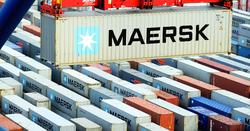Maersk aims for zero carbon emissions by 2050

The shipping industry is currently struggling to find commercially acceptable solutions to low-sulphur regulations. But now Maersk has upped the ante with a call for a zero-carbon shipping sector within 30 years.
Danish liner giant calls for innovation to help it move towards a carbon-neutral future by mid-century
DANISH container carrier Maersk Line has pledged to cut carbon emissions to zero by 2050, in an effort to accelerate developments in carbon-neutral vessels and technology.
“The only possible way to achieve the so-much-needed decarbonisation in our industry is by fully transforming to new carbon neutral fuels and supply chains,” Maersk chief operating officer Søren Toft said in a statement.
“The next 5-10 years are going to be crucial. We will invest significant resources for innovation and fleet technology to improve the technical and financial viability of decarbonised solutions. Over the last four years, we have invested around $1bn and engaged 50+ engineers each year in developing and deploying energy efficient solutions. Going forward we cannot do this alone.”
Maersk wants carbon neutral vehicles to be available by 2030 and is seeking an acceleration in new innovations.
The world’s largest container line said research and development was key to taking the shipping industry away from fossil-based technology.
By setting an ambitious target, Maersk hopes to generate an incentive for researchers, technology developers, investors, cargo owners and legislators that will promote industry involvement, co-development, and sponsorship of sustainable solutions that have yet to see in the maritime industry.
Maersk pointed out that electric trucks, which are yet to enter commercial service, can carry just two teu for 800 km per charge.
“In comparison, a container vessel sailing from Panama to Rotterdam carries thousands of teu over 8,800 km,” Maersk said. “With short battery durability and no changing points along the route, innovative developments are imperative.”